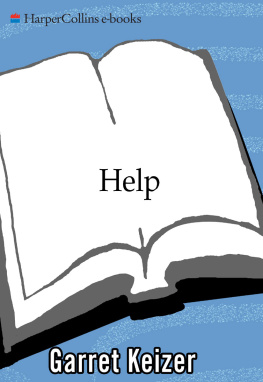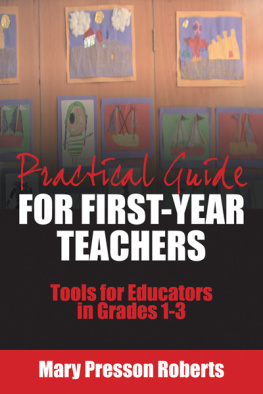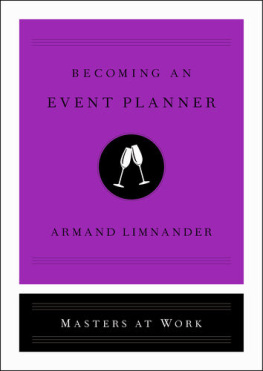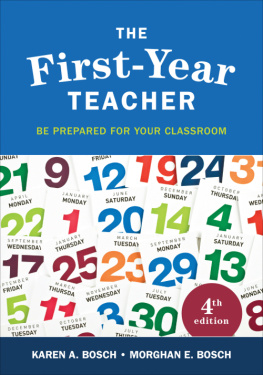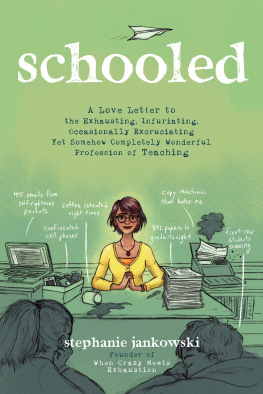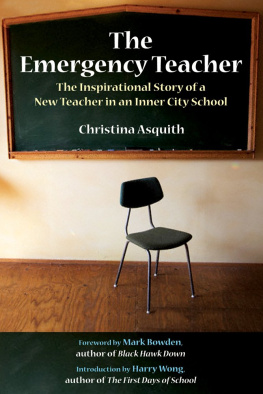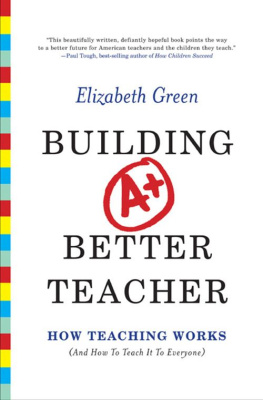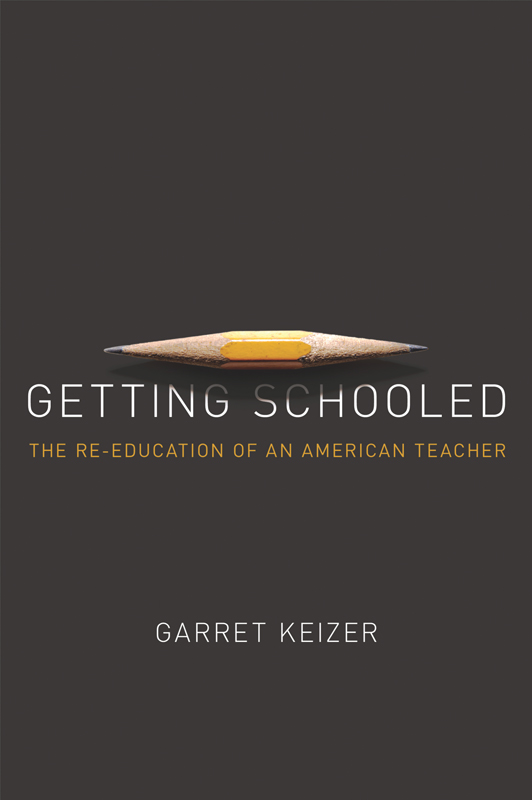Contents
Guide

The author and publisher have provided this e-book to you for your personal use only. You may not make this e-book publicly available in any way. Copyright infringement is against the law. If you believe the copy of this e-book you are reading infringes on the authors copyright, please notify the publisher at: us.macmillanusa.com/piracy.
For the Teachers
NOTE TO THE READER
Getting Schooled grew out of an essay of the same title that was published in the September 2011 issue of Harpers Magazine. The adults mentioned in these pages have been given their real names or pseudonyms or have been left unnamed as judged best by the author. No student appears with his or her real name. Certain details have been altered to camouflage identities, but none of the incidents recounted have been invented, exaggerated, or otherwise distorted.
CONTENTS
I know nothing about education except this: that the greatest and the most important difficulty known to human learning seems to lie in that area which treats how to bring up children and how to educate them.
MONTAIGNE
BEGINNERS
You go back, Jack, do it again.
Steely Dan
In the fall of 2010, after a fourteen-year hiatus from the classroom and at the unpropitious age of fifty-seven, I began a one-year job filling in for a teacher on leave from the same rural Vermont high school that Id entered as a rookie thirty years before. I signed on mainly because my wife and I needed the health insurance. The reason I trained to be an English teacher in the first place was my parents insistence that I graduate from college with a trade, poet falling short of the mark in their eyes. Its fair to say that I have never gone to work in a school with what might be called purity of heart, though much of what I know about purity of heart I learned there.
It can still surprise me that I became a teacher at all. I could have satisfied my parents requirements by pursuing a different trade; sometimes I wish I had. With a push in either direction, I think I could have managed to become a halfway decent attorney or machinist. I am not one of those high school teachers whose teenage years evoke such an irresistible nostalgia that they enter the ranks mainly in the hope of chaperoning a prom.
Nor, when I say surprise, do I mean to suggest that mine is the well-worn path of the marginal student who feels called to the classroom in order to help kids have an easier time than he had. That is often a noble story, among the noblest in the field of education, but it is not my story. I was a good student at school, and when I applied myself, an exceptional student. At the risk of sounding immodest, I should probably add that there are people who would tell you that I am an exceptional teacher. There are former students of mine who would find it difficult to imagine that I could ever have wanted to do anything else.
I never had that difficulty. In fact, there was never a time during the sixteen years I taught when I didnt imagine doing something else. Even in the best moments, when teaching gave me the kind of rush some people find in skydiving or cocaine, I yearned to be at home writing. In the worst, I would imagine putting my name in at the local furniture plant, which I might well have done but for the impossibility of lying about my white-collar credentials to bosses whose kids, nieces, or nephews Id had in class. I cant recall a single year of teaching that I didnt begin with a burst of enthusiasm accompanied by the fervent hope that come June Id be done with teaching for good.
There is no simple way to account for that contradiction. From my earliest grades, I was fascinated with teaching and repulsed by school. By second grade I was asking my teachers permission to teach the class about my scientific passions at the time: dinosaurs, rocks, and planets. I still marvel at the number of times she yielded the blackboardto say nothing of the rarity with which my classmates rewarded my efforts with a black eye. But as early as first grade, I was throwing up my breakfast every morning out of anxiety before the school bus arrived. I had no trouble holding down my food on weekends and holidays. To this day the mere act of entering a schoolthat first whiff of disinfectant, that crackling interplay of regimentation and anarchyis enough to turn my stomach.
Becoming a professional teacher intensified, and complicated, the emotions Id felt as a kid. Teaching could be wonderful, and even when it wasnt, the students I taught could be wonderful. It made me sad to see some of them graduate, though in time I realized that part of my sadness had to do with being left behind. They were going on to do what they really wanted to do, whereas I wasnt. In a ridiculous but palpable way, I felt less grown up than the gowned graduates who shook my hand and embraced me. After all, an adult is someone whos finished with high school. The distinction tends to blur when you find yourself matching wits with a mouthy fourteen-year-old or asking a principal if you can pretty please leave the building on your lunch break to run home and retrieve the corrected papersyour homeworkthat you left on the kitchen counter. The greatest challenge of teaching is not, as is so often averred, finding a way to relate to kids. It is rather finding a way to relate to yourself in a process that often leaves you feeling like a kid.
A good part of that challenge has to do with the burden of evaluation. A childs acute awareness of measuring up, and of failing to measure up, exists for few adults with the same remorseless constancy as it does for a teacher. Everything a student fails to learn is something a teacher has failed to teach. (And everything that might be construed as wrong with the society at large can be placed, and inevitably will be placed, at the feet of its teachers.) Work harder, you tell yourself, but hard work is not always enough. Knowledge of material and technique is not always enough. You can still fail. What is more, you will fail. Certain social conditions combine with certain working conditions to make failure a foregone conclusion. The realization that I could work every waking hour of every day and still fall short of the most modest expectations was the first great lesson of my teaching career. I ought not to have found it so stunning. A teacher in the ancient world might have had a handful of pupils; he would have eaten and even lodged with them throughout their tutelage. Jesus Christ had twelve. In his first year of teaching, Garret Keizer had around a hundred.
The teaching position to which I applied in 2010 would give me a mere eighty. And I knew more about how to teach English than I did as a beginner. I was also better at the math. I knew, for example, that asking my students to put pen to paper only once a day would give me four hundred pieces of paper by weeks end. Giving each piece of paper a scant ten minutes of my attention would require sixty-seven hours of correction. Thats a lot of homework, and it doesnt count as preparation, which at its best ought to exceed correction by a factor of no less than two.
Within days after the principal called to say that I had the one-year job if I still wanted it, which is to say, within days after refusing my wifes final plea not to take it, I began having nightmares. I often have nightmares, but these were less obscure in their meanings. Even the fantastic ones werent hard to figure out.
For instance, I am on a raft on the ocean a short distance from another raft. There is a creature slumped on that other raft that I surmise is either dead or close to it. Still, I hoist and flex the long metal pole in my hand so as to bring one of the leaden balls attached to either tip thudding down on its bowed shaggy head. I dont know how long Ive been at this methodical braining, but as soon as I deliver one blow, I hoist the undulating rod above my head, watching intently for when the ball is in the right position for me to deliver the next. I dont dare to relax my concentration for even a second. If I dont make sure to kill this thing, it will kill me. It is easily five times my size.


